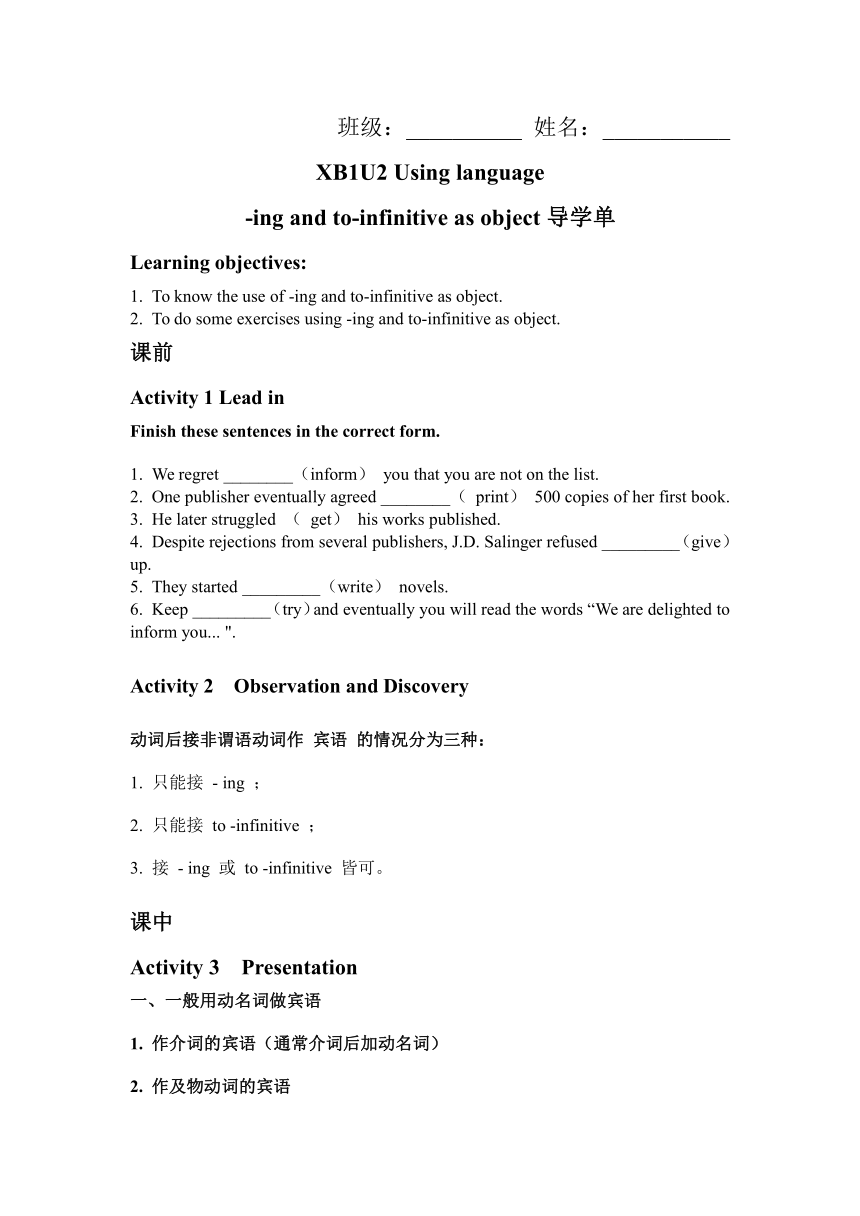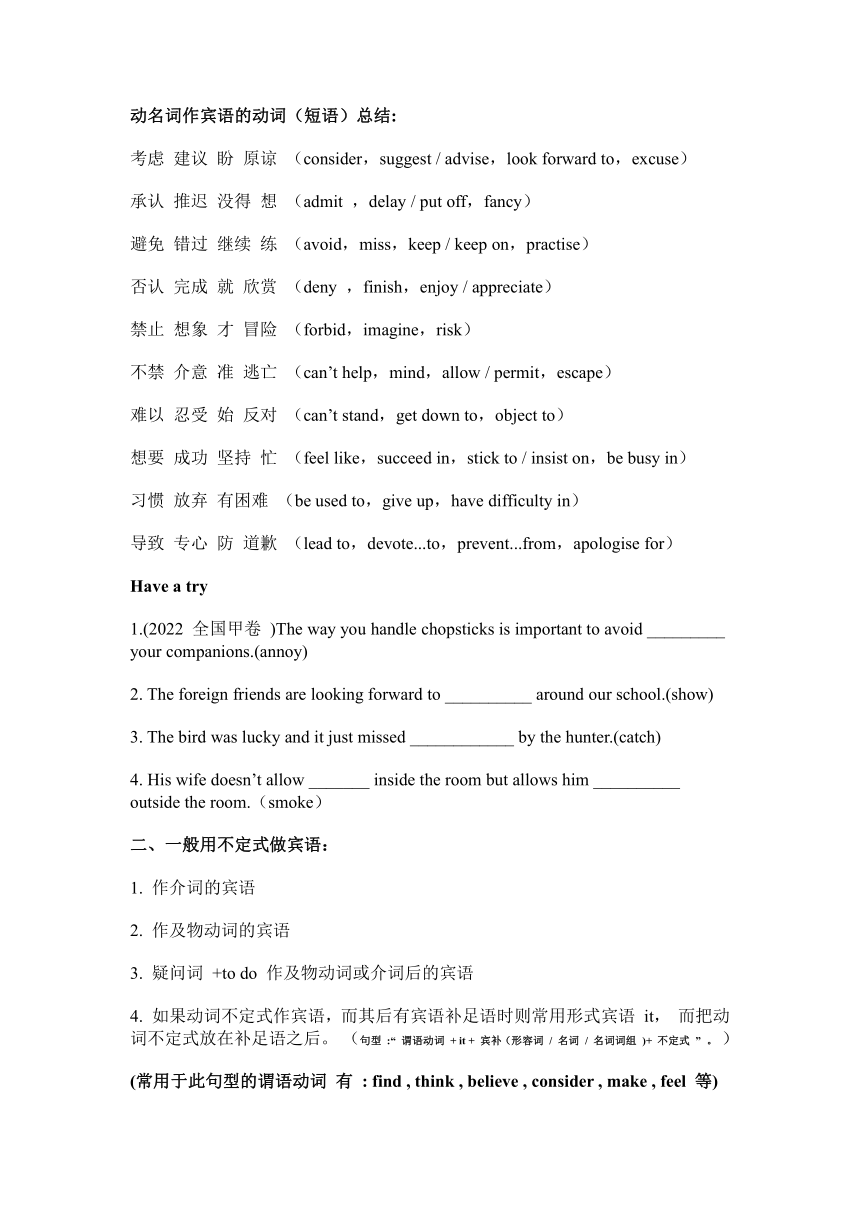外研版(2019)选择性必修 第一册Unit 2 Onwards and Upwards Using language 导学案(无答案)
文档属性
| 名称 | 外研版(2019)选择性必修 第一册Unit 2 Onwards and Upwards Using language 导学案(无答案) |

|
|
| 格式 | docx | ||
| 文件大小 | 21.1KB | ||
| 资源类型 | 教案 | ||
| 版本资源 | 外研版(2019) | ||
| 科目 | 英语 | ||
| 更新时间 | 2024-11-28 00:07:52 | ||
图片预览


文档简介
班级:__________ 姓名:___________
XB1U2 Using language
-ing and to-infinitive as object导学单
Learning objectives:
To know the use of -ing and to-infinitive as object.
To do some exercises using -ing and to-infinitive as object.
课前
Activity 1 Lead in
Finish these sentences in the correct form.
We regret ________(inform) you that you are not on the list.
One publisher eventually agreed ________( print) 500 copies of her first book.
He later struggled ( get) his works published.
Despite rejections from several publishers, J.D. Salinger refused _________(give) up.
They started _________(write) novels.
Keep _________(try)and eventually you will read the words “We are delighted to inform you... ".
Activity 2 Observation and Discovery
动词后接非谓语动词作 宾语 的情况分为三种:
1. 只能接 - ing ;
2. 只能接 to -infinitive ;
3. 接 - ing 或 to -infinitive 皆可。
课中
Activity 3 Presentation
一、一般用动名词做宾语
1. 作介词的宾语(通常介词后加动名词)
2. 作及物动词的宾语
动名词作宾语的动词(短语)总结:
考虑 建议 盼 原谅 (consider,suggest / advise,look forward to,excuse)
承认 推迟 没得 想 (admit ,delay / put off,fancy)
避免 错过 继续 练 (avoid,miss,keep / keep on,practise)
否认 完成 就 欣赏 (deny ,finish,enjoy / appreciate)
禁止 想象 才 冒险 (forbid,imagine,risk)
不禁 介意 准 逃亡 (can’t help,mind,allow / permit,escape)
难以 忍受 始 反对 (can’t stand,get down to,object to)
想要 成功 坚持 忙 (feel like,succeed in,stick to / insist on,be busy in)
习惯 放弃 有困难 (be used to,give up,have difficulty in)
导致 专心 防 道歉 (lead to,devote...to,prevent...from,apologise for)
Have a try
1.(2022 全国甲卷 )The way you handle chopsticks is important to avoid _________ your companions.(annoy)
2. The foreign friends are looking forward to __________ around our school.(show)
3. The bird was lucky and it just missed ____________ by the hunter.(catch)
4. His wife doesn’t allow _______ inside the room but allows him __________ outside the room.(smoke)
二、一般用不定式做宾语:
1. 作介词的宾语
2. 作及物动词的宾语
3. 疑问词 +to do 作及物动词或介词后的宾语
4. 如果动词不定式作宾语,而其后有宾语补足语时则常用形式宾语 it, 而把动词不定式放在补足语之后。 (句型 :“ 谓语动词 + it + 宾补(形容词 / 名词 / 名词词组 )+ 不定式 ” 。 )
(常用于此句型的谓语动词 有 : find , think , believe , consider , make , feel 等)
动词不定式作宾语,通常有三种形式:
(1) 一般式: 表示的动作与谓语动词的动作(状态)同时发生,或是在它之后发生。当动词不定式的逻辑主语是其所表示的动作的发出者时,用主动形式 (to do) ;当动词不定式的逻辑主语是其所表示的动作的承受者时,用被动形式 (to be done)。
(2) 进行式 (to be doing) : 动词不定式所表示的动作与谓语动词所表示的动作同时发生,并强调动作的持续性或动作正在进行。
(3) 完成式 (to have done) : 动词不定式所表示的动作发生在谓语动词所表示的动作之前。
注意:介词but, except(除了) 后接不定式作宾语。
若介词 but, except 之前没有实义动词 do, 而是有其他动词 , 则 but, except 等介词后要接带 to 的动词不定式作宾语。(前有 do ,后无 to )
不定式作宾语的动词及记忆:
决心 学会 想 希望 (decide / determine , learn, want, expect / hope / wish)
拒绝 设法 愿 假装( refuse , manage, care, pretend )
主动 答应 选 计划( offer , promise, choose, plan)
同意 请求 帮一帮(agree, ask / beg , help)
要求答应来帮忙。 (demand ,promise,help)
准备决定遭拒绝, (prepare ,decide,refuse)
敢于选择有希望。(choose,wish,hope,want,expect)
不能做到莫假装,(fail,pretend) 设法做成决心强。(manage,determine)
恳求安排又威胁,(beg,arrange,threaten) 声称目标不犹豫。(claim,aim,hesitate)
Have a try
1.(2022 全国乙卷 ) However, some high sugar brands, like Classic Coca Cola, have accepted the sugar tax and are refusing ___________ (change) for fear of upsetting consumers.
2.she pretended ______________ (listen) to the manager, but actually she was thinking about something else
3. With Wechat becoming more and more popular in China, we seem _______________(lose) the art of communication.
可以接动名词(doing)和不定式(to do)做宾语的动词:
接to do和doing意思无区别:_________________________________________
接to do和doing意思有很大区别:____________________________________
Have a try
The teacher regretted ________ (tell) Tom he didn't pass the exam, and Tom regretted not ___________ (study) hard.
I left the office, but forgot _________ (turn) off the lights.
After he finished ________ (do) maths homework, he went on __________ (write) a composition作文.
How would you feel if moving to a new town meant __________(lose) track of失去联系 your friends?
I can't help _________(be) upset about his rude behaviour.
课后
Activity 4 Practice
用括号内所给动词的正确形式填空。
1. I finished ________ (type) the report at one o’clock.
2. Can you imagine ________ (live) without electricity
3. I’m sorry, Jay. I didn’t mean ________ (be) rude to you.
4. We got up late but managed ________ (get) to the airport on time.
5. Your hair wants __________________ (cut). You’d better have it done tomorrow.
6. He offered ________ (drive) us to the hotel, but we preferred to walk.
7. I try to avoid ________ (go) shopping on Saturdays. It’s too crowded.
8. Why don’t you give up ________ (smoke) It’s really bad for your health.
9. I regret ________ (tell) you that there’s nothing we can do to help you.
10. Edward pretended ________ (be) reading a book when his mother entered.
XB1U2 Using language
-ing and to-infinitive as object导学单
Learning objectives:
To know the use of -ing and to-infinitive as object.
To do some exercises using -ing and to-infinitive as object.
课前
Activity 1 Lead in
Finish these sentences in the correct form.
We regret ________(inform) you that you are not on the list.
One publisher eventually agreed ________( print) 500 copies of her first book.
He later struggled ( get) his works published.
Despite rejections from several publishers, J.D. Salinger refused _________(give) up.
They started _________(write) novels.
Keep _________(try)and eventually you will read the words “We are delighted to inform you... ".
Activity 2 Observation and Discovery
动词后接非谓语动词作 宾语 的情况分为三种:
1. 只能接 - ing ;
2. 只能接 to -infinitive ;
3. 接 - ing 或 to -infinitive 皆可。
课中
Activity 3 Presentation
一、一般用动名词做宾语
1. 作介词的宾语(通常介词后加动名词)
2. 作及物动词的宾语
动名词作宾语的动词(短语)总结:
考虑 建议 盼 原谅 (consider,suggest / advise,look forward to,excuse)
承认 推迟 没得 想 (admit ,delay / put off,fancy)
避免 错过 继续 练 (avoid,miss,keep / keep on,practise)
否认 完成 就 欣赏 (deny ,finish,enjoy / appreciate)
禁止 想象 才 冒险 (forbid,imagine,risk)
不禁 介意 准 逃亡 (can’t help,mind,allow / permit,escape)
难以 忍受 始 反对 (can’t stand,get down to,object to)
想要 成功 坚持 忙 (feel like,succeed in,stick to / insist on,be busy in)
习惯 放弃 有困难 (be used to,give up,have difficulty in)
导致 专心 防 道歉 (lead to,devote...to,prevent...from,apologise for)
Have a try
1.(2022 全国甲卷 )The way you handle chopsticks is important to avoid _________ your companions.(annoy)
2. The foreign friends are looking forward to __________ around our school.(show)
3. The bird was lucky and it just missed ____________ by the hunter.(catch)
4. His wife doesn’t allow _______ inside the room but allows him __________ outside the room.(smoke)
二、一般用不定式做宾语:
1. 作介词的宾语
2. 作及物动词的宾语
3. 疑问词 +to do 作及物动词或介词后的宾语
4. 如果动词不定式作宾语,而其后有宾语补足语时则常用形式宾语 it, 而把动词不定式放在补足语之后。 (句型 :“ 谓语动词 + it + 宾补(形容词 / 名词 / 名词词组 )+ 不定式 ” 。 )
(常用于此句型的谓语动词 有 : find , think , believe , consider , make , feel 等)
动词不定式作宾语,通常有三种形式:
(1) 一般式: 表示的动作与谓语动词的动作(状态)同时发生,或是在它之后发生。当动词不定式的逻辑主语是其所表示的动作的发出者时,用主动形式 (to do) ;当动词不定式的逻辑主语是其所表示的动作的承受者时,用被动形式 (to be done)。
(2) 进行式 (to be doing) : 动词不定式所表示的动作与谓语动词所表示的动作同时发生,并强调动作的持续性或动作正在进行。
(3) 完成式 (to have done) : 动词不定式所表示的动作发生在谓语动词所表示的动作之前。
注意:介词but, except(除了) 后接不定式作宾语。
若介词 but, except 之前没有实义动词 do, 而是有其他动词 , 则 but, except 等介词后要接带 to 的动词不定式作宾语。(前有 do ,后无 to )
不定式作宾语的动词及记忆:
决心 学会 想 希望 (decide / determine , learn, want, expect / hope / wish)
拒绝 设法 愿 假装( refuse , manage, care, pretend )
主动 答应 选 计划( offer , promise, choose, plan)
同意 请求 帮一帮(agree, ask / beg , help)
要求答应来帮忙。 (demand ,promise,help)
准备决定遭拒绝, (prepare ,decide,refuse)
敢于选择有希望。(choose,wish,hope,want,expect)
不能做到莫假装,(fail,pretend) 设法做成决心强。(manage,determine)
恳求安排又威胁,(beg,arrange,threaten) 声称目标不犹豫。(claim,aim,hesitate)
Have a try
1.(2022 全国乙卷 ) However, some high sugar brands, like Classic Coca Cola, have accepted the sugar tax and are refusing ___________ (change) for fear of upsetting consumers.
2.she pretended ______________ (listen) to the manager, but actually she was thinking about something else
3. With Wechat becoming more and more popular in China, we seem _______________(lose) the art of communication.
可以接动名词(doing)和不定式(to do)做宾语的动词:
接to do和doing意思无区别:_________________________________________
接to do和doing意思有很大区别:____________________________________
Have a try
The teacher regretted ________ (tell) Tom he didn't pass the exam, and Tom regretted not ___________ (study) hard.
I left the office, but forgot _________ (turn) off the lights.
After he finished ________ (do) maths homework, he went on __________ (write) a composition作文.
How would you feel if moving to a new town meant __________(lose) track of失去联系 your friends?
I can't help _________(be) upset about his rude behaviour.
课后
Activity 4 Practice
用括号内所给动词的正确形式填空。
1. I finished ________ (type) the report at one o’clock.
2. Can you imagine ________ (live) without electricity
3. I’m sorry, Jay. I didn’t mean ________ (be) rude to you.
4. We got up late but managed ________ (get) to the airport on time.
5. Your hair wants __________________ (cut). You’d better have it done tomorrow.
6. He offered ________ (drive) us to the hotel, but we preferred to walk.
7. I try to avoid ________ (go) shopping on Saturdays. It’s too crowded.
8. Why don’t you give up ________ (smoke) It’s really bad for your health.
9. I regret ________ (tell) you that there’s nothing we can do to help you.
10. Edward pretended ________ (be) reading a book when his mother entered.
